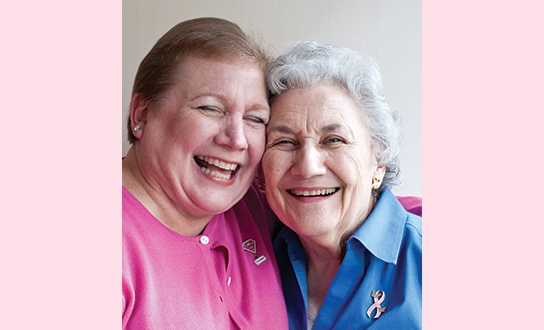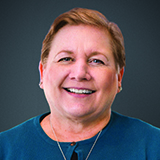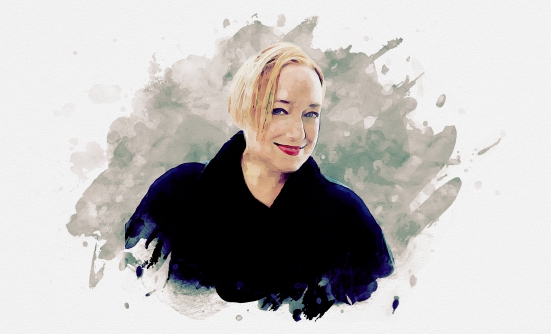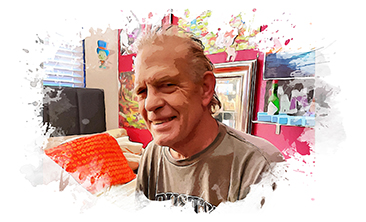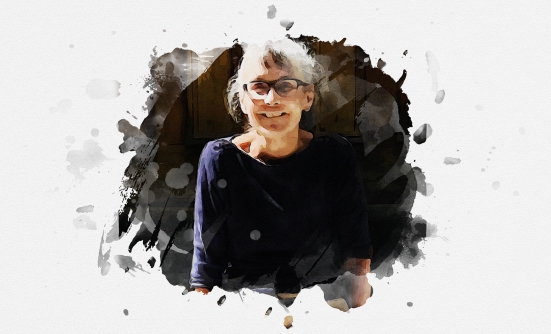My introduction to breast cancer came when, as a child, our family friend, Miss Bertha, was diagnosed with the disease. Unfortunately, it was already stage IV breast cancer, having spread to her liver, lungs, and bones. We didn’t have many treatments 50 years ago. I laughed with Miss Bertha as she and her fellow breast cancer survivor Lena shared stories of their misadventures with breast prosthetics (that 50 years ago resembled jellyfish) and inflatable bras—did you know that those can explode when flying on a plane?
I listened as Miss Bertha defied the odds, telling her oncologist that she would outlive him (she did!). And perhaps most important, I learned the difficulty that many women have in discussing their disease with others. I have since dedicated my personal and professional time to doing just that.
If my first experience with breast cancer showed me how the disease can bring people together, my second experience with the disease showed me just how isolating a cancer diagnosis could be.
Years ago, as a young student nurse, I found myself working in the recovery room of the hospital where I was getting my training, when a woman who had just undergone a biopsy, followed by a total radical mastectomy, was brought in. In those days, a breast biopsy was done under general anesthesia, and if cancer was detected, a mastectomy was performed right away while the patient was still under anesthesia. Back then, this meant removing the breast and all the breast tissue, both chest muscles, all the lymph nodes under the arm and down to the lung area and having skin from elsewhere on the body removed and grafted to the chest to close their wound. So, when my patient woke up, she had no idea what the biopsy had found.
She asked if they had taken her breast, and I froze, saying nothing at first but ultimately confirming the woman’s worst fear. I called my mother that night and told her what a horrific experience I had witnessed with my patient crying, and I, her student nurse, crying too. I told my mom, “look at the way a woman finds out she has breast cancer. No wonder this is the most feared disease among all women.” My mom said that she predicted at some point that once I finished nursing school and was in practice, I would likely figure out better ways to care for such patients, so that their surgery and other treatment, including their body image issues, could be addressed in a less frightening way.
Just a few years later, I had my third experience with breast cancer. I had already seen my friends and patients come face-to-face with the disease, but now it was my turn.
A Life-Saving Mammogram
In my mid-30s, I felt a lump on my right breast. A precautionary mammogram confirmed that what I had felt was a cyst. That was lucky. What was even luckier (or perhaps unlucky, depending on how you look at it) was that the radiologist recommended doing a baseline mammogram on my opposite breast, since I was now in my mid-30s. That mammogram picked up an abnormality on my left breast, that I wasn’t aware of. Without that mammogram, who knows how long it would’ve been before I found out I had cancer—who knows how much the cancer would have grown.
During the biopsy of the abnormality, the surgeon told me he had planned to take “something” out that was the size of a walnut, but he ended up taking out something that was the size of an orange. That’s okay, I told him. I’ve got 44Ds on my chest. I don’t think I’ll notice that tissue gone, I added. As you can see, I was able to find humor in this not-so-funny situation, a lesson I’d learned years ago from Miss Bertha and Lena. However, I frankly wasn’t thinking at all that what he might be removing would turn out to be cancer.
This was in 1992, and I worked at Johns Hopkins where my biopsy was done, so when my mother kept calling me asking me if I had any news yet, I decided to not wait any longer for the doctor to return from his speaking engagement in Germany. I pulled my own report up on the computer and saw that I had invasive ductal carcinoma. I thought the Grim Reaper was staring at me right through that monitor. I was numb, just like any patient would be.
A Family Experience
I don’t remember driving home that day. I have no idea how I got home, but when I did, the phone rang, and it was my mother. “Do you know anything yet?” she asked. I was silent just like I had been with that patient in the recovery room years ago. My silence, like back then, said enough. I thought, “My mother is a wreck, and I am a wreck, and we cannot help each other in this moment.” I finally told her, “Mom, we didn’t get the news we were hoping for. I can’t talk right now. I will have Al call you when he gets home. It will likely be around midnight.” I then hung up. I knew she was a basket case.
I decided to practice how I was going to tell my husband, Al, about my diagnosis. So I went into the bathroom and looked at myself in the mirror, saying, “You know that the doctor dropped some hints to me while doing the biopsy procedure. He said I had a very diseased breast. He said that he was removing a section of tissue much larger than he anticipated taking out. He told me that he wanted to be the one to review with me the pathology results rather than one of his colleagues who I didn’t know as well as I knew him. (I also was going to tell him that) mom had been calling me every night, anxious to get good news as soon as possible, so I decided to pull up my own report today rather than waiting for the surgeon to get back into town, and I was stunned at what I read. I do actually have breast cancer.”
At 11 pm that night, my husband got home. “I’m still up, because I have breast cancer,” I blurted these words out as soon as he walked in. Everything I had practiced about what to say, had left my mind. He called my mom back and told her, “Mom, we didn’t get what we had hoped for, but Lillie is made of tough stuff. She is your and Frank’s daughter. We will get our arms around one another as a family and take this disease on. Try not to worry.”
My husband took it in stride, but when it came to telling our 12-year-old daughter Laura, I wanted to share my diagnosis with a little more tact. I encouraged her to ask any questions she might have, and she did. The first 2 questions I expected, because patients have told me that their children have asked these same questions. But beginning with the third question, I realized I had no anticipated answers for those questions:
- She asked if I was going to die.
- She asked if I got breast cancer because I gave birth to her.
- She asked if my doctor would let her bring my breast home to keep in a jar. And when you are sad, you could go down and look at it on the mantel. (I told her that I would rather leave it at the hospital for researchers to use the breast tissue with the hope that one day other mommies wouldn’t need to worry about getting breast cancer.)
- She asked if the doctor would take the remaining boob and move it to the middle of my chest. (When I asked her why, she said, “Because if he doesn’t, you are going to lean to the right when you walk.” I explained that I would be wearing a breast prosthesis that would fit inside the pocket of a mastectomy bra to hold it in place, so my silhouette would still look whole.) She said, “A bra with a pocket—what a clever thing. You always worry that when you go to the ATM machine to take out money, someone might steal it from you. Now you will be able to put it in the mastectomy bra pocket, and no one will be able to get it!”
For the first time in about 5 days, I laughed, and it felt so good to laugh again. These were real questions for her, but she also found our sense of humor for us.
A Transformed Woman
As I was wheeled into the operating room for my mastectomy, my husband told me he’d see me again after my “transformation surgery” was complete. “You’re exchanging your breast for another chance at life, you are being transformed from a victim into a survivor. It will be a fair trade,” he said.
As I recovered in the hospital after surgery, my usual ability to find humor in every situation faltered. I had been stoic all evening, dealing with nausea and vomiting that prevented me from going home, where I wanted to be. Each time my evening shift nurse came in to empty my drains, check my bandages, or hang a new IV bag, she would ask how I was, and I always responded that I “was fine.” After my husband left at 10 pm, and I was finally alone—alone with my thoughts and fears—my nurse came in. This time, when the nurse asked how I was doing, the floodgates opened up.
“I have no idea how I ended up on this side of the bed rail,” I told the nurse. “But I’ll tell you something, it is really scary over here. I have a 12-year-old to raise, and I don’t know what’s going to happen to me.” The nurse stayed with me even after her shift had ended, putting my side rail down, sitting on the bed, and holding my hand, looking at me intently. These simple acts of being there and listening had a lasting impact on me, and I made sure that the nurse knew how meaningful it was for me.
I wanted to let her know how significant she is—not just that day, not just that moment, but for the rest of my life. I’ve written many books, and I’ve written articles just about this nurse. She gave me what she had the least to give, and what I needed the most—she gave me her time.
That night in the hospital, I contemplated time. I didn’t go to sleep. I didn’t want to miss any amount of my life. I thought about all the times that I had been in my car, driving to work, and there was the sun coming up, and I’m at the traffic light tapping my foot, waiting for that light to change. Why wasn’t I looking at the sun coming up? “Well it will be there tomorrow, I can look at it then,” I told myself then, but now I was thinking, “maybe I won’t be here tomorrow to look at it.” And so, as the sun rose in my hospital window, I thought I had never seen such a beautiful sunrise.
Taking Back Control
One of the things I was most nervous about before my mastectomy was when my husband would first see me without my left breast. To regain some control over the situation, I asked him to make a trade.
“I want to choose the moment when you see me with one breast,” I told him. “And I want to see you without your dentures for the first time.”
I was to go home the day after my surgery at 9 am. My surgeon told me he would be seeing me at 6 am to do a dressing change before he went to the operating room for the day. Without my knowledge, and at the request of the surgeon, my husband came at 6 am to observe the doctor doing the first dressing change. As the surgeon pulled back the dressing, and I could feel the cool air on my body, I thought that I had never been this naked before in my life, and with my husband on his knees right in front of me, there was no hiding. He looked at me and said, “Baby we’re fine. You are a transformed woman. I love you.”
I still couldn’t speak, but if I could have, I would have yelled, “Take out your teeth!!” Nearly 3 decades later, I still have not seen my husband without his dentures. He and my surgeon had discussed my anxiety about my self-image and sexuality and arranged to jumpstart my intimacy with my husband much before I was ready. I would have waited months. They did make the right decision for this patient.
Looking for a Sign
A year after the surgery, I found that I needed to have a lumpectomy, and 10 months after that, a second mastectomy. Ten years later, I was eligible for breast reconstruction surgery, but whether to have the procedure was not an easy choice. I was a strong advocate for my patients to have reconstruction. And just because I had other medical issues that had prevented me from getting this restorative procedure done didn’t mean that I wasn’t a big fan of restoring a woman’s silhouette to being whole again.
I went to church by myself and asked for a sign. “God, give me a sign if it is okay with you that I have breast reconstruction, and if you never give me a sign, that will be just fine.” I felt silly doing this and promised myself as I left the church that I would never tell anyone that I had been there and made this request of the Almighty.
As I started my car in the parking lot to leave, the radio was on and was playing “Sexual Healing” by Marvin Gaye. I hadn’t heard this song for at least 15 years. When he sang “I can’t wait for you to operate. You’re my medicine, open up and let me in,” I made my decision. Several months later, as I was falling asleep on the operating table for the reconstructive surgery, the same song blared through my headphones. Speaking of a sign. I had DIEP Flap reconstruction surgery and have never regretted my choice.
Looking Back
In some way, breast cancer has shaped much of my life, as I implemented the lessons from other women’s experiences into my own battle with the disease. After experiencing breast cancer firsthand—the good, the bad, and the sometimes slightly inappropriately funny—I have been able to pass on those lessons to countless women through my work with breast cancer survivors.
Miss Bertha is never far from my thoughts either. She lived many years, 21 to be exact, with her stage IV breast cancer, at a time that the average life expectancy was less than 6 months. I conduct 3-day, 2-night retreats for women with stage IV breast cancer. There are 2 programs: one for couples and the other for women to bring their female caregivers. Amazing things happen at these retreats, including genuine belly laughing, and some tears. I know Miss Bertha is there with me as I support these patients and their loved ones for what lies ahead.
Someone asked me, “But if you had your life to live over again, certainly you wouldn’t want breast cancer diagnosis and treatment to be a part of
it, right?” I told this reporter, “Wrong. I am not a believer in making believe we can change our fate, or even attempt to look at our life backward and wonder ‘what ifs’ that might have been. My experiences with breast cancer as a youngster when Miss Bertha was diagnosed, as a student nurse, and as a breast cancer patient have added to molding me into the person I am today. I am proud of the advocacy work I have accomplished as a breast cancer patient advocate, of the research I have accomplished focused on preserving quality of life, and getting sexuality and intimacy out on the table to be discussed rather than hidden. And I am not done yet. As long as women are being diagnosed today, no matter what their stage, there is a continuous need to improve the patient’s experience.”





